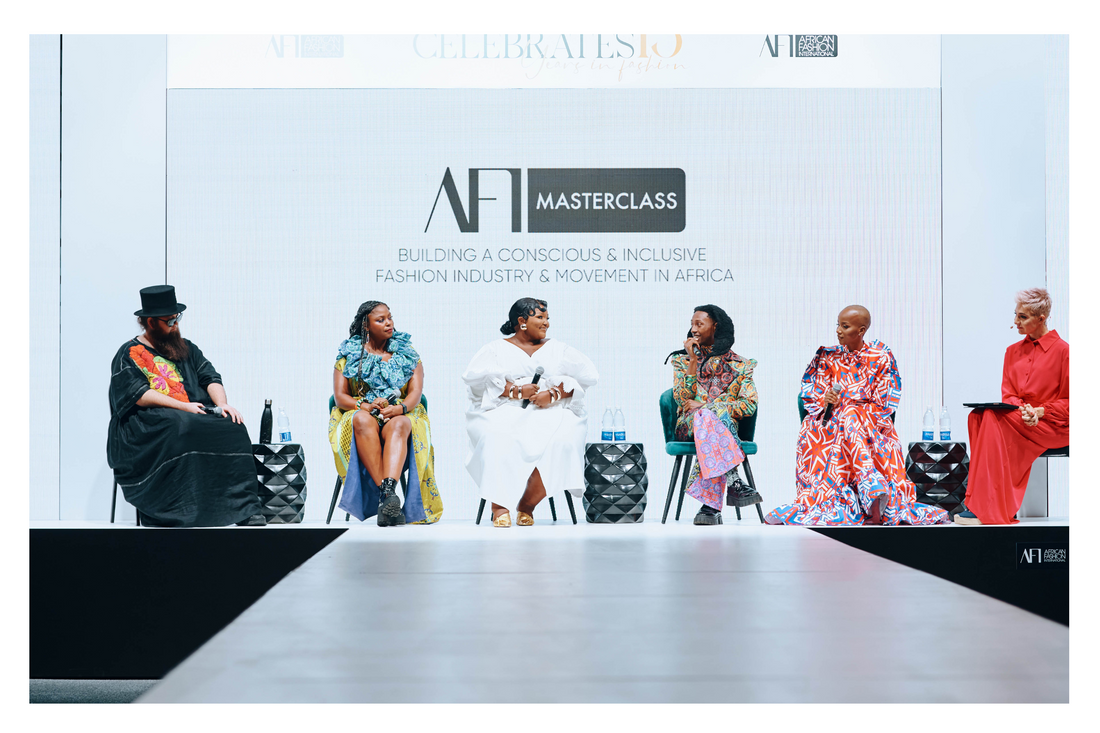
Insights from the AFI Masterclass on Building an Inclusive Fashion Industry in Africa
Share
African fashion fundis discuss ways to build an inclusive fashion industry
Building a Sustainable Future for Fashion: A Conversation on Consciousness and Diversity at the AFI Masterclass
By RANJI MANGCU
The last three years have been a period of immense transformation, both in and around the fashion industry. A global pandemic, historic events that created widespread discussions on diversity, inclusion and the environment, and an energy crisis causing severe disruption to economies, are some of the factors that have contributed to this shift.
It was appropriate then, when Cape Town Fashion Week returned, that the AFI held a Masterclass that filled in the blanks of all that had occurred in the interim.
Representing a rich cross section of the fashion industry, six leading voices were invited to discuss the importance of “Building a Conscious and Inclusive Fashion Industry & Movement.”

Liezel van der Westhuizen, donning a stylish pink outfit from House of Nala, expertly facilitated the AFI Masterclass during Cape Town Fashion Week. The engaging discussion involved some notable names in fashion including Ky Bxshxff, Nontando Mposo, Yoliswa Mqoco, Masa Mara and Shudufhadzo Musida.
Led by seasoned MC Liezel Van Der Westhuizen, the panel included award-winning social media influencer and content creator Yoliswa Mqoco, fashion editor and film director Ky Boshoff; the editor in chief of Glamour South Africa, Nontando Mposo; fashion designer and sculptor Masa Mara; as well as model, author, and former Miss South Africa, Shudufhadzo Musida.
From students to industry professionals, almost every audience member spent the hour vigorously taking notes.
Conversations regarding race, inclusivity and sustainability have been gaining traction over the past decade. Many large retailers are modifying their offerings and advertising to accept a wider range of people, regarding religious beliefs, gender identity, size and more.
Despite this apparent progress certain contradictions remain within the fashion industry that need to be addressed. As we continue to engage with these difficult topics our language surrounding them will become increasingly diverse.
Actioning inclusivity in the fashion industry requires ensuring that the points at which the conversation starts are inclusive in themselves. In the same vein, actioning sustainability requires ensuring that human beings are themselves sustained, with choices beyond fulfilling their own basic needs.
Bringing socio-political and environmental concerns into one conversation within the parameters of fashion might seem an intimidating task.
However, it was an assertion by Mqoco, that eloquently established the key driver of the conversation: “How can fashion sustain the human being enough that they are able to wholeheartedly engage in sustaining the world outside of themselves?” she asked.
Poignantly remarking that her desire to contribute to a sustainable movement in fashion is undercut by the unfortunate truth that her own body is: “not sustained by the fashion industry understanding of representation as a key form of sustenance.
Her point offered a unique perspective that grounded the conversation in the agreement that in both representation and sustainability, fashion needs to re-invest in people more than metrics and profits.
Dressed in a celestial white dress with fanned, pleated sleeves, Mqoco credited the work of expert CMT’s for allowing her to create her own representation – preserving her love of fashion when the industry’s neglect of plus-size people’s bodies left her feeling alienated.
The fashion industry has a responsibility to do more than court human beings into opening their wallet. It has a mountain of work to do in embracing the broad scope of human perspectives. While its end goal is to sustain the habitability of the planet, sustainability is a human-driven pursuit so it holds up that the human beings at its helm in fashion must be included in fashion, especially in African economies.

This looks like representation, size inclusion and retailers prioritizing ethical production rather than profits. Glamour’s Mposo, put it best: “We have to ensure that people are not being left behind in the conversation… We are in Africa, so our landscape is different.”
Emphasizing the importance of infrastructure and education in enacting constructive change in the fashion industry, Mposo’s point called attention to the crucial dual mandate that is currently held by African fashion industries: re-defining the scope of what’s possible in African fashion and storytelling, while engaging in global efforts towards disrupting a culture of heedless consumption.
Speakers’ points fluently enriched one another, creating a powerful back and forth between them. Mposo’s point was well-trussed by Musida’s note that fashion is a vital vehicle for seeing oneself reflected. It makes worlds possible for the many who often live on the margins of representation.
Echoing Musida’s point, was CEO of FEDISA, Allan Le Roux. Speaking from the audience, Le Roux expressed the key question that FEDISA is currently asking itself as a leading fashion institution in South Africa: “How do we change the academic process that creates the fashion industry?”
Stressing the importance of a much larger eco-system that sustains the fashion industry, Le Roux’s statement urged the youth to imagine themselves as professionals in fashion – not only as designers, but as part of the greater value chain that drives this industry.
Towards the end of the Masterclass, fashion editor Ky Boshoff stunned the audience with the obvious truth that should transcend the capital-driven metrics: “Clothing is a human right”.
The audience collectively caught its breath at Boshoff’s reminder; perhaps a testament to how frequently and easily this much is forgotten amidst the numbers and profit margins.
Armed with a stellar panel, AFI’s first Masterclass of 2023 led a much-needed conversation about where African fashion industries are and where they appear to be going.
Garnering invaluable audience participation, the panellists captured the realities of the fashion industry. Underpinning their critiques was a sense of optimism around all that African industries are capable of, and what they can do for African people.
